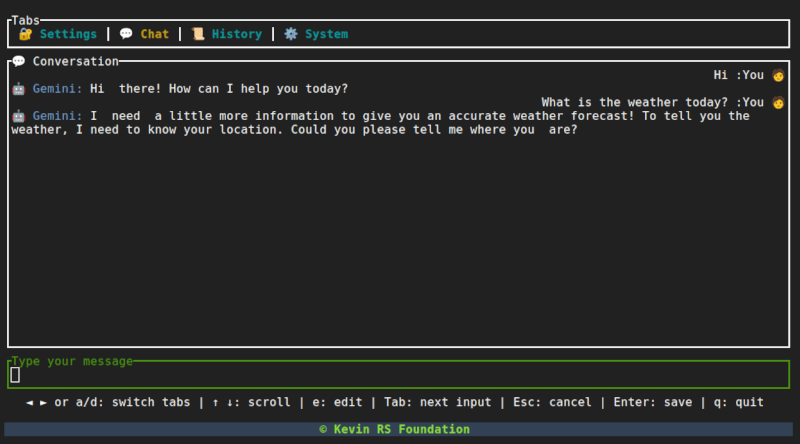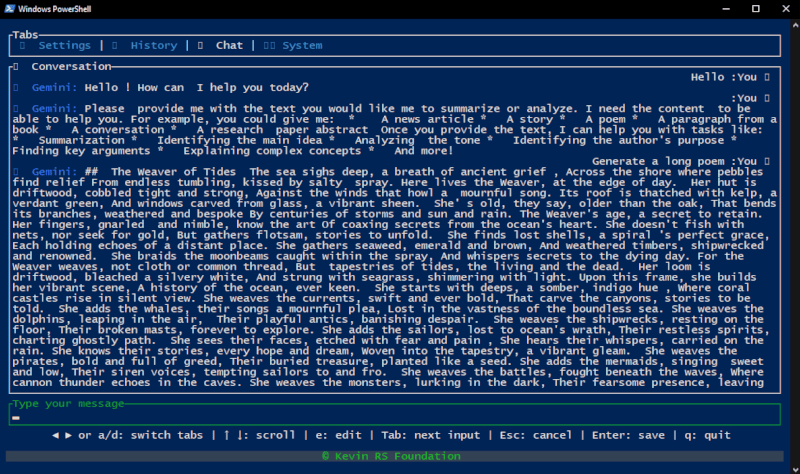14 releases
| 0.1.3 | Apr 18, 2025 |
|---|---|
| 0.1.2 | Apr 15, 2025 |
| 0.0.9 | Nov 15, 2024 |
| 0.0.7 | Mar 4, 2024 |
#510 in Command line utilities
668 downloads per month
Used in autogpt
74KB
1.5K
SLoC
💎 Gems
🐧 Linux (Recommended) |
🪟 Windows |
|---|---|
 |
 |
| Download Executable File | Download .exe File |
cargo install gems --all-features |
cargo install gems --all-features |
💎 GEMS: A cli, tui, and sdk for interacting with the Gemini API, allowing you to generate creative content, perform text-related tasks, and get information about supported models.
📖 Table of Contents
🚀 Installation
To install the gems cli, use the following Cargo command:
cargo install --locked gems --all-features
✨ Features
- Interact with the Gemini API from the terminal.
- Generate creative content with ease.
- Stream generation of content for continuous output.
- Count the number of tokens in a text.
- Generate images.
- Embed content into a specified model.
- Batch embed multiple contents efficiently.
- Get information about the current model and list available models.
Usage
Before using the gems CLI, make sure to set the following environment variables:
export GEMINI_API_KEY=<your_gemini_api_key>
export GEMINI_MODEL=<your_gemini_model>
Generate an api key from Google AI Studio.
⌨ Usage as CLI
Generate creative content:
gems generate -t "Hello"
Analyze an image and generate content from text:
curl -o image.jpg https://storage.googleapis.com/generativeai-downloads/images/scones.jpg
gems vision -i image.jpg
gems vision -i image.jpg -t "What's in the image?"
Stream generation of content:
gems stream -t "Generate a short fictional story"
Count the number of tokens in a text:
gems count -t "Hello There!"
Embed content into a specified model:
gems embed -t "Write a story about a magic backpack."
Batch embed multiple contents:
gems batch -t "Write a story about a magic backpack.","Generate a poem about nature."
Get information about the current model:
gems info
List available models:
gems list
Generate an Image
gems imagen -t "Hi, can you create a 3d rendered image of a pig with wings and a top hat flying over a happy futuristic scifi city with lots of greenery?"
TUI mode
gems
🎨 Options
| Option | Description |
|---|---|
| `` | TUI mode. |
--api-key |
Specify the API key for accessing the Gemini API. |
--model |
Specify the model to use for generating content. |
🛠 Subcommands
| Subcommand | Description |
|---|---|
generate |
Generate creative content. |
vision |
Analyze an image and generate content from text. |
stream |
Stream the generation of content. |
imagen |
Generate an image. |
count |
Count the number of tokens in a text. |
embed |
Embed content into a specified model. |
batch |
Batch embed multiple contents. |
info |
Get information about the current model. |
list |
List available models. |
✨ Usage as Dependency
-
Add the
gemscrate:[dependencies] gems = "0.1.3" -
Use the
Clientstruct to interact with the Gemini API:use gems::Client; use gems::traits::CTrait; use gems::messages::Content; use gems::messages::Message; use gems::models::Model; use gems::chat::ChatBuilder; use anyhow::Result; #[tokio::main] async fn main() -> Result<()> { let mut gemini_client = Client::builder().model("your-model").build()?; gemini_client.set_api_key("your-api-key".to_string()); let parameters = ChatBuilder::default() .model(Model::Flash20) .messages(vec![Message::User { content: Content::Text("Hello".to_string()), name: None, }]) .build()?; match gemini_client.chat().generate(parameters).await { Ok(response) => { println!("{}", response); } Err(err) => { eprintln!("Error: {:?}", err); } } Ok(()) }
📌 Examples
This repository contains a list of notebooks examples on how to use the sdk and or the cli. To use the notebooks in this repository, you need to set up your environment. Follow these steps to get started:
-
Clone the repository to your local machine:
git clone https://github.com/kevin-rs/gems.git -
Install the required dependencies and libraries. Make sure you have
Rust,Jupyter Notebook, andevcxr_jupyterinstalled on your system.# Install a Rust toolchain (e.g. nightly): curl --proto '=https' --tlsv1.2 -sSf https://sh.rustup.rs | sh -s -- -y --default-toolchain nightly # Install Jupyter Notebook pip install notebook # Install evcxr_jupyter cargo install evcxr_jupyter evcxr_jupyter --install -
Navigate to the cloned repository and build the project:
cd gems cargo build --release --all-features -
Start Jupyter Notebook:
jupyter notebook -
Access the notebooks in your web browser by clicking on the notebook file you want to explore.
| ID | Example | Open on GitHub | Launch on Binder | Launch on Colab |
|---|---|---|---|---|
| 1 | Basic | |||
| 2 | Rocket | |||
| 3 | Axum |
🤝 Contributing
Contributions and feedback are welcome! If you'd like to contribute, report an issue, or suggest an enhancement, please engage with the project on GitHub. Your contributions help improve this crate for the community.
📄 License
This project is licensed under the MIT License.
Dependencies
~7–23MB
~311K SLoC